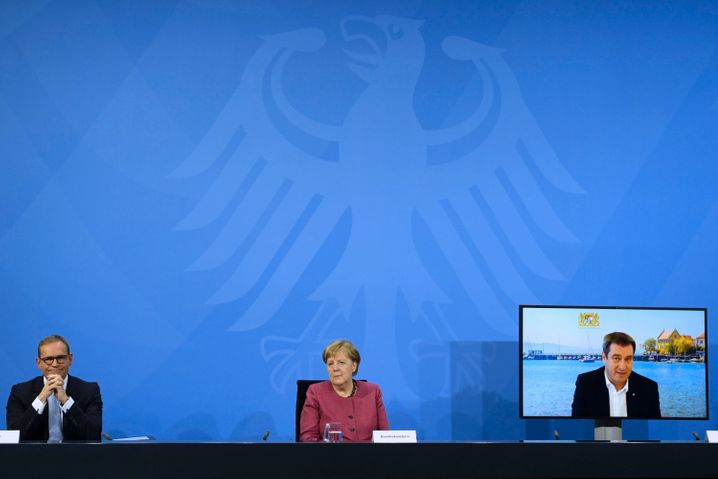In the end, Markus Söder found conciliatory words. The vaccination summit between the federal government and the Länder has brought a lot of clarification, said Bavaria’s Prime Minister at the subsequent press conference. “It’s getting better every day in Germany,” he said. The more vaccine there is, the more people will be vaccinated.
But currently, as the prime ministers have stated in their video conference with the federal government, apparently to their surprise, the quantities are still limited. And if the children should also be vaccinated, Söder explained, then it is just about redistribution.
Redistribution in this case means: there will be no separate vaccine deliveries for children from 12 years. If, as expected, the European Medicines Agency approves the Biontech/Pfizer vaccine for children over 12 years of age on Friday, they will be able to make an appointment for vaccination – just like everyone else-as soon as the vaccination priority ends on 7 June. This also applies if the Standing Vaccination Commission (Stiko) comes to a different conclusion ten days later in its assessment of the benefits and risks of vaccination for children.
The announcements of the last few days had sounded quite different. Federal Health Minister Jens Spahn had announced in an interview with the “Bild am Sonntag” a large vaccination campaign for schoolchildren until the end of August. The suffering of the children in the pandemic preoccupies him a lot, Spahn said. It sounded like an attempt to make amends, as children and young people in the pandemic were mostly left behind in many political decisions.
But Spahn had not really made it clear where the vaccine was to come from for the age group of twelve to 18 – year-olds, which comprises a total of around 5.3 million people. Assuming a vaccination readiness of 60 percent in this group, the Ministry of Health has calculated a need of 3.18 million doses each for the first and the second vaccination. As a result, experts feared a slowdown in the vaccination campaign by about two weeks.
Countries expected special quotas for children
The issue caused a heated dispute between the country’s leaders and the Minister of Health at the vaccination summit. First of all, it was about a certain word and its meaning. As stated in the last decision of the Conference of Ministers of Health: Those countries that ensure by means of a concept that a vaccination offer for children between twelve and 18 years is submitted by the end of August, “receive from the federal government the required doses of vaccination for the first and two vaccinations in addition”.
»Additional.”In the countries it was understood that “additional” means “more”: they expected special quotas for the children.
In contrast, the Federal Ministry of Health did not know where these doses were to be conjured up. Finally, the vaccine quantities were initially ordered for the adult population alone. “Additional” therefore only meant a new distribution. The preparations are therefore obtained from the contingent of family and company doctors, Spahn explained in the column. Gradually until the end of August.
Several Prime Ministers attacked Spahn for this statement. What was the point of such a decision, if the additional commitment could not be true at all, wanted Baden-Württemberg’s Prime Minister Winfried Kretschmann (Greens) to know. “If we do not get an additional vaccine, we need a new assessment of the situation,” said Rhineland-Palatinate Prime Minister Malu Dreyer (SPD), according to participants.

Müller, Merkel, Söder after the vaccination summit
Photo: Annegret Hilse / dpa
When the heads of the other parties had already worked on Spahn, Bavaria’s Prime Minister Söder once again addressed his Union colleagues. The health ministers had spoken of “additional vaccine”, “in agreement with the federal government”.
Children can not immediately count on appointments
Finally, it is stated: from 7 June, children over the age of twelve are equal to all other people when vaccinating. All those who have not received vaccination until then.
In the decision of the federal and state governments, a small blow in the direction of Spahn is noted: “Due to the limited availability of vaccines, this does not mean that appointments are already available for this group at short notice.”However, countries could organise special offers in vaccination centres or specific vaccination programmes for children and young people on their own.
After the summit, Chancellor Angela Merkel (CDU), Berlin’s governing Mayor Michael Müller (SPD) as chairman of the Prime Minister’s Conference and his deputy Söder tried to whitewash the controversies of the previous four hours at the joint press conference.
Vaccinating is not everything, was their message. A safe school operation, so assured all, should be guaranteed regardless of how many children are vaccinated. School and holiday trips did not depend on the vaccination of children, Merkel stressed: “The vaccination of children is a very sensitive act.«
It seemed as if the federal and state governments wanted to take a burden off their shoulders: life can start again, even if the smallest can still get sick. For many parents, this may sound like mockery.
Most of the children did not get seriously ill, explained Berlin’s Mayor Müller, even if the infection rate among children and young people was high. Therefore, it has now been agreed not to give preference to the younger ones in the order of vaccination.
They agreed, after all. But the resentment towards the Minister of Health had not subsided after the round. How did there even come to be a dispute about additional vaccine supplies for children?
While the Chancellor quickly tried to appease the question of whether Spahn had promised too much in terms of vaccine quantities and spoke of misunderstandings, the monitor saw the switched-on Markus Söder answer without a word: he nodded.


